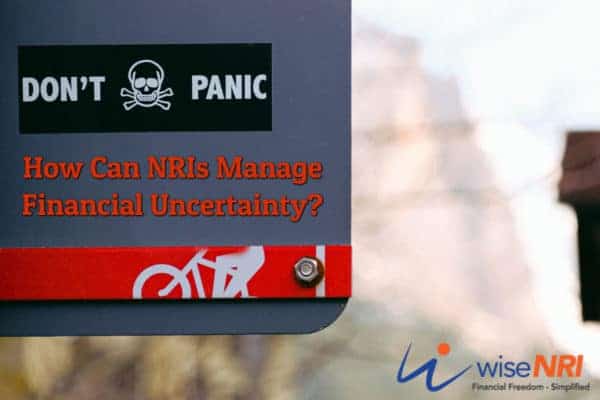The world is in a unique situation. Never has any event created such a global impact. The coronavirus pandemic has taken a toll on most countries in the world. It is causing medical issues, social issues, and economic problems.
Let me share while writing this post I am in isolation – I am at home but can’t meet family members. I was in touch with a friend whose younger sister is diagnosed with Covid-19. These are tough times but this too shall pass.

Mr. NRI & Financial Uncertainty
I can understand all that is happening right now can have a huge impact on your financial plans. That’s why I keep repeating that financial life is dynamic so financial plans can’t be static.
As an NRI, you will be concerned about losing your regular income, business downturn, or erosion in your wealth.
You may start thinking about scenarios related to moving back to India. You might be alarmed when you look at your portfolio. You might have lost significant value in your portfolios in India and your country of residence. Some of your investments might be at loss.
Moreover, you are not sure when the business will bounce back or when the markets will recoup these losses as there seems to be no cure as of now. How does NRI handle this financial uncertainty in multiple markets?
Must-Read – Financial Planning for NRIs – How it’s different & complex
Keep long-term investments as-is
The long-term investments that you have made are based on some reasoning and targets. Markets will move up and down based on various events. In the past, the financial crisis in the US and the SARS outbreak affected the markets but in the long run, markets bounced back. Similarly, hold on to investments done on the basis of appropriate research and analysis.
Maintain your asset allocation
These events tend to be temporary in nature. You need not panic and make knee-jerk reactions. Do consider worst-case scenarios but do not act as if these scenarios have already happened. Stay true to your long-term financial goals, and investment strategy.
Read – 5 Financial Must-Haves For NRIs
Avoid the purchase of physical assets and debt (loans)
Do not take loans either in India or abroad during this time unless it is a real emergency. You might get offers to buy physical assets at a lower price than it was before the coronavirus outbreak. It is best if you avoid buying physical assets such as houses now as the situation is still grim. If the asset is in India, you may not be able to travel to India and evaluate it thoroughly. Paperwork could be difficult. The purchase may not be in your best interests and this can affect your finances negatively.
Reduce Your Expenses
I don’t want to write about how important it is to keep your expenses low. Already written 2 posts on this

Check- Mr. NRI – Don’t spend for keeping up with Joneses
Avoid personal or business travel
International flights are already grounded so you can’t think of coming back right now. You might want to travel to a country where you can continue your work without restrictions. It is better to put a hold on these travel plans. Remain calm and stay put in your place so that you avoid putting yourself or others at risk.
Must Read – Resident Foreign Currency Account
Consume news and views intelligently
The news channels and websites are on a roll with the latest updates on the pandemic and its effects. There are many images and videos being shared on social media too. As an NRI, it is natural that you will want updates on the Indian market. It is important to be abreast of what is happening but at the same time, you have to filter out the clutter and pay attention to critical news.
Keep Calm
It is difficult to not be stressed in these difficult times. Your body and mind may want to respond to stress. This might cause you to make decisions that may not be in the best interests of your financial health. It is important to remain calm so that you think clearly and take rational steps to manage your finances.
You can use meditation and other stress relief strategies to keep your mind and body stable.
Check – What is mandate holder
“Do not take any step in panic and consult with your financial advisor before making any financial decision.” wiseNRI
Take Help
Most of us have not faced such a global, long-term financial uncertainty. It can lead to different conditions and reactions. Some people feel a loss of control. Others might feel pessimistic or go into a depression. Some others may take rash steps such as liquidating investments or overspending.
- Be practical and acknowledge the situation you are in and take appropriate help. You can chat with friends and family about your fears and feelings. Be in contact with extended family and friends back home via video calls. You can even have virtual lunches together and spend time with one another. You can consult with mental health professionals or therapists to help you deal with your emotions and reactions.
- Talk to your financial advisor. They will be able to understand the financial crisis better and suggest a plan of action for you. If you do not have one, consider talking to a financial planner. They will help you understand the weak points of your financial health and how you can manage them. They can put together a high-level plan for you so that your financial goals are in place and you know your financial status.
- Many companies and banks are offering relief measures to help consumers tide over the crisis. If you require help, ensure you take advantage of these measures. For example, many banks in the UK are offering repayment holidays on loans. Utility companies in the Philippines are extending deadlines for the payment of bills. Credit card companies in the US are refunding overdraft fees and issuing refunds on late fees on request.
“Financial matters are complex, more so if you are an NRI. But managing them is not impossible.”
Let’s work on your Financial Plan
Historical data shows that in the long-term financial markets are able to tide over such events even though they are disrupted in the short term. Having a strategy to deal with such situations rather than making hasty decisions will help your financial status.
Do not take any step in panic and consult with your financial advisor before making any financial decision.

Thanks – clear sensible thoughts! Do you have any inkling as to whether RBI may place further restrictions on overseas remittance (India to other country)?
Thanks Rajiv – I have no idea about RBI future actions…